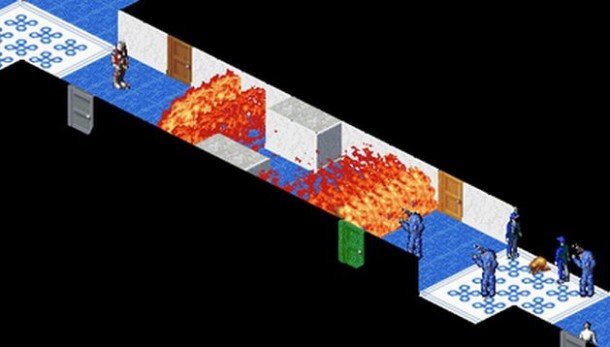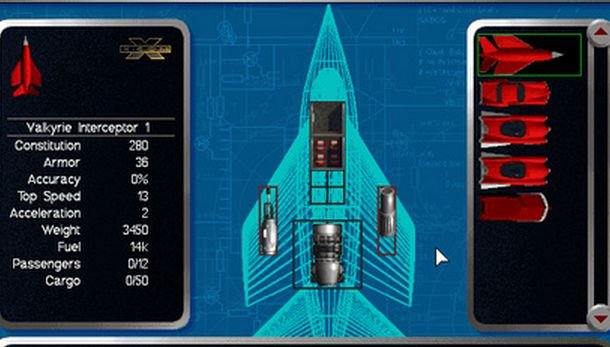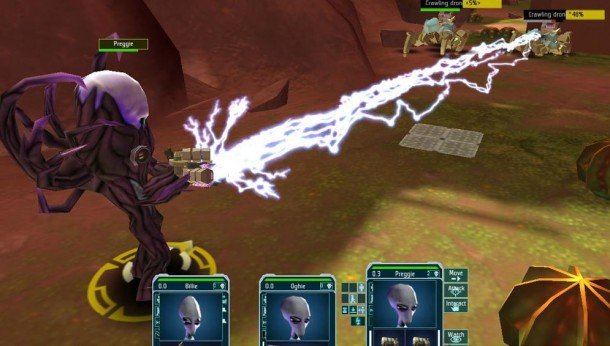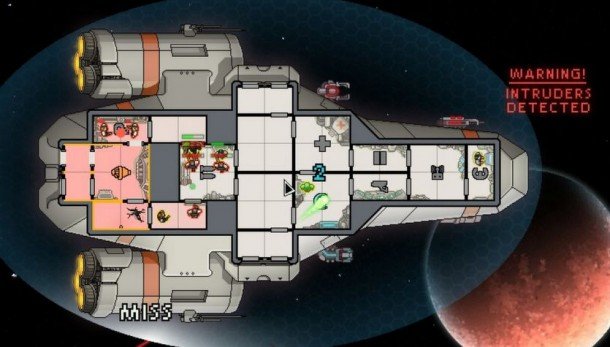Julian Gollop interview: on X-Coms old and new, the Ghost Recon strategy game that never was, AI, auteurs and "Fork My Fruit"

PC Gamer: You are a board gamer yourself, aren't you?
Julian: Yeah, I play board games. Absolutely. Far more than computer games.
PC Gamer: Would you design board games? Is that something you wanted to do or have done?
Julian: I do. Well, I have done, yes. Interestingly, Chaos, the game that I'm now remaking, was originally a board game.
PC Gamer: Was it a board game or card based?
Julian: Card based. Basically you had grid of squares, your board or arena. You had a wizard character, you put it on your wizard card and you had a hand of cards which was your spells. So to cast a spell you put your card down, roll the dice to cast it. If it's a creature it goes on the board, you can start moving it around and attacking enemies. If it's a spell, you have to resolve the effect of the spell. So yeah, it was originally a board game. On my blog I've got some pictures of the cards. I put them up a couple of months ago. So, I still have the original cards from this board game that I made. I often had lots of ideas for board games. I made one - a couple, actually - while I was at Ubisoft which we played with the level designers there. I've never tried getting any of them published.
I've got a question about Terror from the Deep, were you involved with that?
Keep up to date with the most important stories and the best deals, as picked by the PC Gamer team.
Julian: I had absolutely nothing to do with it.
PC Gamer: When I was a kid, I knew that it came out (and) I was extremely excited and then I played it and it and went, "This feels like an asset swap, except I can't use some of my guns on land".
Julian: I think pretty much the entire code base was identical to the first game. I don't think they really changed very much.
PC Gamer: Last year at GDC I spoke to Frederick Raynal who made Alone in the Dark. He had this thing where he made Alone in the Dark, he didn't sleep more than about 3 hours a night for a year. It got to the end of the year and the publisher said, "It's doing really well! We're going to put another one out. We're just going to do exactly the same thing. We're just going to make a clone and change a few bits” and he quit immediately. To me it seemed that Terror from the Deep had that air about it. Had you left the company?
Julian: No, no, yeah. What happened was, we started working on XCOM: Apocalypse pretty much the same time as they started work on Terror from the Deep. What really happened was that myself and Nick wanted to do a different game to XCOM, or at least do something a little bit different than just remake the original, so that's how XCOM: Apocalypse came about. There were some significant differences in the way that the game worked.
PC Gamer: Apocalypse had a bit of Sim City about it, I remember.
Julian: You were in this city and it had different organisations in this city with diplomatic relationships with each other and stuff. But they wanted a sequel within 6 months basically, this is what they wanted and we had to say "Well, it's not possible to do anything except re-skin the game with some (new) graphics".
Actually, they changed the story of course, I guess the clever bit, it was all about under the sea rather than Mars. Actually, it took a year to do the game. I had a huge team on it. Well, when I say huge I mean like, 15 people. Compared to just me and Nick and Helen, John and Martin on the graphics side of the original, this was much bigger.
PC Gamer: It must be strange to see studios with 400 staff, like Destiny, which is the Bungie game that's been announced.
Julian: Well I know from working at Ubisoft they have hundreds upon hundreds working on Assassin's Creed - more than 400. Assassin's Creed 3 is absolute bare minimum 600 people, probably, were working on it for most of the time worldwide across many studios.
PC Gamer: Their studio in Montreal, is it 2100 people?
Julian: It's huge. Ubisoft and probably other big publishers actually, they're making games by pure brute force.
PC Gamer: Having the Shanghai studio which is cheap to do lots of asset generation.
Julian: Yes. Obviously, these games require a huge amount of asset generation. It's like a factory. They're an immensely difficult undertaking, to be sure.

PC Gamer: You had your huge team of 15 people on Terror from the Deep, is that right? Or XCOM: Apocalypse?
Julian: On XCOM: Apocalypse the team size for that actually was 5 of us at Mythos Games working on it and there was a team of artists at Microprose working on it as well. Again, it's a similar arrangement to the first game where we were doing the programming and Microprose were doing the artwork. But it was a disastrous project, even from the beginning, because one thing that happened is that the Microprose art team were trying to change the design of the game. Then they were failing to actually deliver anything that they promised. They just couldn't get the isometric graphic system sorted out in their heads. They did things which just didn't work, like they hired a guy whose name I forget to design the aliens, and this is a well known Science Fiction artist and he built these big models of the aliens and the idea was that they were going to scan them and put them into a 3D modelling software. It just didn't work. He had all this fine detail in these models and this scanning system just wasn't good enough.
PC Gamer: I do remember the aliens in it looking a bit blobby.
Julian: Then they had to recreate them basically in a 3D software they were using at the time. Yeah, they were awful, blobby things. They were nasty. Terrible graphics. It was very difficult.
PC Gamer: I still enjoyed playing it in the end, mainly because of jet bikes equipped with plasma cannons and missiles.
Julian: We had a real time system as well which was interesting, actually. It had some interesting aspects to it, but I don't think you can beat turn based games for simple straightforward playability.
PC Gamer: And planning tactically, as well. Responding on the fly was just tough, especially when you could just pause. Let's just quickly deal with Interceptor and Enforcer.
Julian: XCOM: Interceptor, yeah. That was the X Wing thing. XCOM: Alliance was an FPS one, yes. It wasn't a straightforward first person shooter, it was like a team based shooter, allegedly something similar to Rainbow 6. But with aliens.
PC Gamer: At what point did you stop being involved with making these games?
Julian: After Apocalypse. So, I had absolutely nothing to do with XCOM: Alliance or XCOM: Interceptor or any XCOM anything else. XCOM: Enforcer? Well, what happened there was that Microprose or Hasbro as it was by then, they had three Unreal licenses, I think, that that had to somehow use. XCOM: Alliance was using Unreal but because that project was going nowhere, they decided to "Well, let's just put out a straightforward Unreal-style shooter using the assets from XCOM: Alliance. We'll at least have something there to show for all the effort".
XCOM: Alliance was in development for a long time. How the development got screwed up, I don't know. As you're probably well aware, quite often games companies start and you're going for a long time and it just doesn't happen.
PC Gamer: This Milo and Kate seems to have broken Peter Molyneux's heart. They just gradually realised they couldn't make something believable. Yeah, it happens a lot.
Julian: It does. It's quite frequent.

PC Gamer: After Microprose and Hasbro stopped making them, suddenly in the late 90s / early 2000s people started making XCOM-inspired games with names like UFO: Afterlight, Aftermath. Some of them were really good, some of them were dreadful.
Julian: UFO: Aftermath arose out of my Dreamland Chronicles project. We did one game for Virgin Interactive called Magic and Mayhem, then I proposed to Virgin, "Why don't we try and do a remaining or remake of the original XCOM with, obviously, a different story? Make it PC and Playstation II". It was still a turn based game, still had all the elements of XCOM there. The tactical part was a little bit different because you controlled characters using a traditional third person controls for a console game.
If you've played Valkyria Chronicles on the PS3 then you've got an idea of how Dreamland Chronicles worked, because it's very similar. We had a little action point bar that would go down as you moved your character just like in Valkyria Chronicles, and when you wanted to shoot somebody you'd get the over the shoulder view, just like in Valkyria Chronicles. When you select characters it was on an overhead map, just like in Valkyria Chronicles.
So, it was looking promising, but Virgin Interactive had problems. They were sold to Interplay and then to Titus Interactive. Titus Interactive took one look at our game and said 'This is rubbish. This is so bad. Sorry, we're not interested in this.' Well, Titus were more interested in the IP that they got from buying Interplay. Whether they managed to do anything productive with it is another question.
So, we had to close the studio. We had a four-game contract with Virgin and now Titus but they were not going to fund this or any other games and we couldn't go to another publisher, so we had to shut the studio. What they did was they took all of the assets that we'd done and they ultimately ended up in the hands of ALTAR Interactive who made UFO: Aftermath. Unfortunately they stripped out our fantastic Valkyria Chronicles style turn based stuff and they put what I thought was a rather weak real-time thing in there.
PC Gamer: The last game they made, Afterlight, was actually good; good characters, a fun plot, interesting Geoscape mechanics.
Julian: I played it very briefly, I seem to remember. Certainly not very much, no. Unfortunately I very rarely finish games these days. Well, from my point of view I don't have the time. A lot of my game playing is more about research than entertainment because with limited time to play games, my interest is finding out what people are doing. At the moment, my main obsession is trying to find turn based games for iPad, for example, to figure out what is there out there that's interesting.
PC Gamer: I get an awful lot from BoardGameGeek.
Julian: There's a lot of board games coming out which is really cool. Very nice. But I'm talking about original turn based, to be tactical turn based games. There's one I like called Battlefield Academy which is also on PC, of course. That's quite nice.

PC Gamer: What are you playing at the moment?
Julian: What am I playing? I know what I'm about to play because I just downloaded it before I came to GDC, which is FTL. I purposefully did not start doing it 'cause I had to finish my presentation so I guess as soon as I get back that's at the top of my list. Before that, I was playing XCOM, of course. I do play games on the iPad as well. The latest one is Battlefield Academy. Outwitters, I quite like. Outwitters is nice. Online turn based game, cutesy graphics, brutal gameplay. Chess-like.
PC Gamer: I haven't heard Chess mentioned once, apart from you, during all the time at GDC. It's not something people learn from any more. They don't reference it any more. That's really odd, considering it was, for 6000 years or however long it's been around.
Julian: I don't know. Maybe people think it's boring and that's all there is to it. If you like Chess, you'll like Outwitters. Outwitters has got a brilliant mechanic in it which is very simple. Each piece has a certain move, a certain strength - attack strength and defence strength - but you can only see the board as far as your pieces can move. So, there's a hidden area of the board, you have to be careful. You're not entirely sure what your opponent's doing. Very simply done. That gives the game a little bit of uncertainly and a bit of edge. It's quite nice.
PC Gamer: Can you see what your opponent can see?
Julian: Not exactly. You're not entirely sure what he can see. Most of the time, actually, you're not sure. Some of the time you're sure because the long range scout units, if you've got those up front on your front lines you know that you can see as much as he can see, because his scout units can't see further than yours sees. It's an intriguing game.
PC Gamer: Oh, that reminds me. The other XCOM game that was in development which has gone very quiet. Did you ever see that?
Julian: Oh yeah, the 2K Marin game. The only thing that I read is that they sort of rebooted it. Obviously, gone back to the drawing board a little bit trying to figure out what the identity of this game should really be. I think they got some bad reactions on several levels. One was the fact it was an FPS. Secondly, the presentation was a bit - this 1950s style alternate reality thing probably didn't go down too well with a lot of people, either, so it may be they're rethinking that. I'm not sure. Graphically, it was amazing.
PC Gamer: Thank you!

